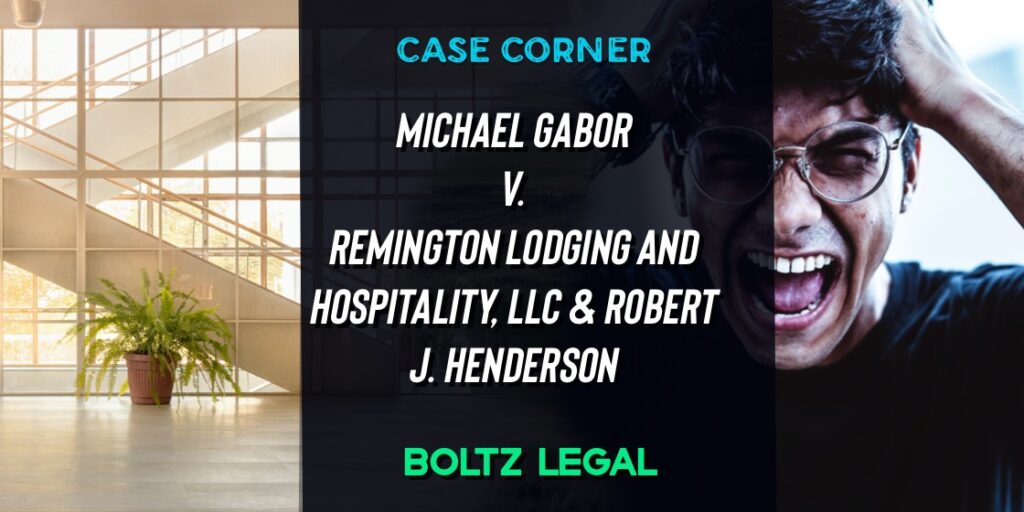Jurisdiction: Fifth District Court of Appeal, Florida
Case No.: 5D2023-3183
Lower Tribunal Case No.: 2016-CA-006690
Date: May 30, 2025
Lower Court: Circuit Court for Duval County, Judge G. L. Feltel, Jr.
Unraveling Employer Liability: Why a Directed Verdict Reversed a Jury’s Partial Verdict
In a personal injury lawsuit involving a hotel guest and a maintenance worker, the Fifth District Court of Appeal recently reversed a jury verdict that awarded limited damages to the plaintiff, Michael Gabor. The case addressed two major theories of liability: vicarious liability and negligent hiring, training, and supervision. The appellate court found that the trial court erred in denying a directed verdict in favor of the employer, Remington Lodging and Hospitality, LLC, and sent the case back with instructions to enter judgment in Remington’s favor.
Background: When a Resort Visit Turns Physical
Michael Gabor sued both a hotel employee, Robert Henderson, and the hotel’s corporate operator, Remington Lodging and Hospitality, after a physical altercation on hotel grounds. Gabor, a guest at the One Ocean Resort and Spa, claimed that Henderson, a maintenance worker at the hotel, caused his injuries during the incident.
At trial, the jury was asked to consider three distinct claims: (1) direct negligence by Henderson; (2) vicarious liability by Remington for Henderson’s actions; and (3) direct liability of Remington for negligent training and supervision of its employees.
The twist? The jury found Henderson not negligent. Yet they still found that Remington was 20% at fault for Gabor’s injuries—assigning Gabor the other 80%.
The Legal Dilemma: Can You Be Liable If Your Employee Isn’t?
This paradox sparked the appellate review. Under well-established Florida law, an employer cannot be held vicariously liable under the doctrine of respondeat superior if the employee is not found to have been negligent. Without employee negligence, there’s nothing for the employer to be responsible for.
This concept, confirmed by past cases like Mallory v. O’Neil and Luebbert v. Adventist Health, meant that once the jury cleared Henderson of wrongdoing, Remington couldn’t be held vicariously liable for his actions.
Negligent Supervision: A Misapplied Theory?
Gabor attempted a backup argument: that Remington had negligently trained or supervised two of its managers—the general manager and the front desk manager—on duty at the time of the altercation.
However, Florida law is clear: a negligent supervision or training claim against an employer must be based on employee actions that fall outside the course and scope of employment. Here, all actions were stipulated to have occurred within the scope of employment.
Further weakening Gabor’s position was his failure to sue the managers individually, which might have provided a pathway to relief. As the appellate court noted, a claim for negligent supervision can sometimes be pursued directly against a supervisor (as in Jones v. Vasilias), but Gabor named only the employer, not the individual supervisors.
What the Court Decided
Given the lack of evidence supporting the direct liability claims and the inconsistency in the jury’s verdict, the Fifth District Court of Appeal found in favor of Remington. The court reversed the final judgment and directed the trial court to enter judgment for the defense.
Why This Case Matters
This case underscores the importance of aligning jury instructions and verdict forms with well-established legal doctrines. It also demonstrates how critical it is for plaintiffs to correctly identify and pursue the proper parties when asserting supervisory negligence claims.
For Florida businesses, especially those in hospitality, the decision provides clarity: liability cannot be imposed on an employer when the employee is found blameless, and claims for supervisory negligence require actions outside the scope of employment or proper identification of the supervising individuals.
Today’s Insight
“Justice is truth in action.”
— Benjamin Disraeli

